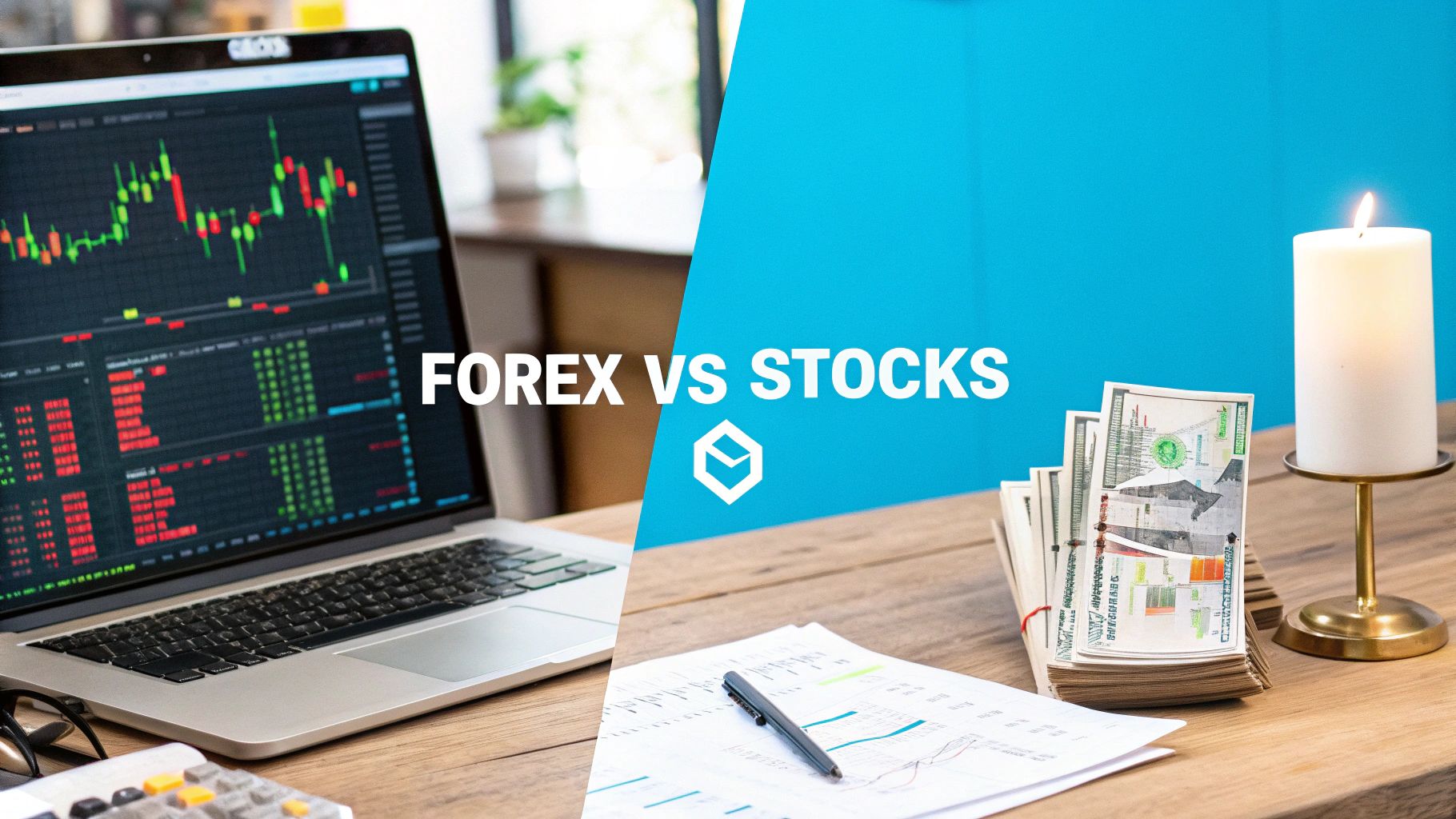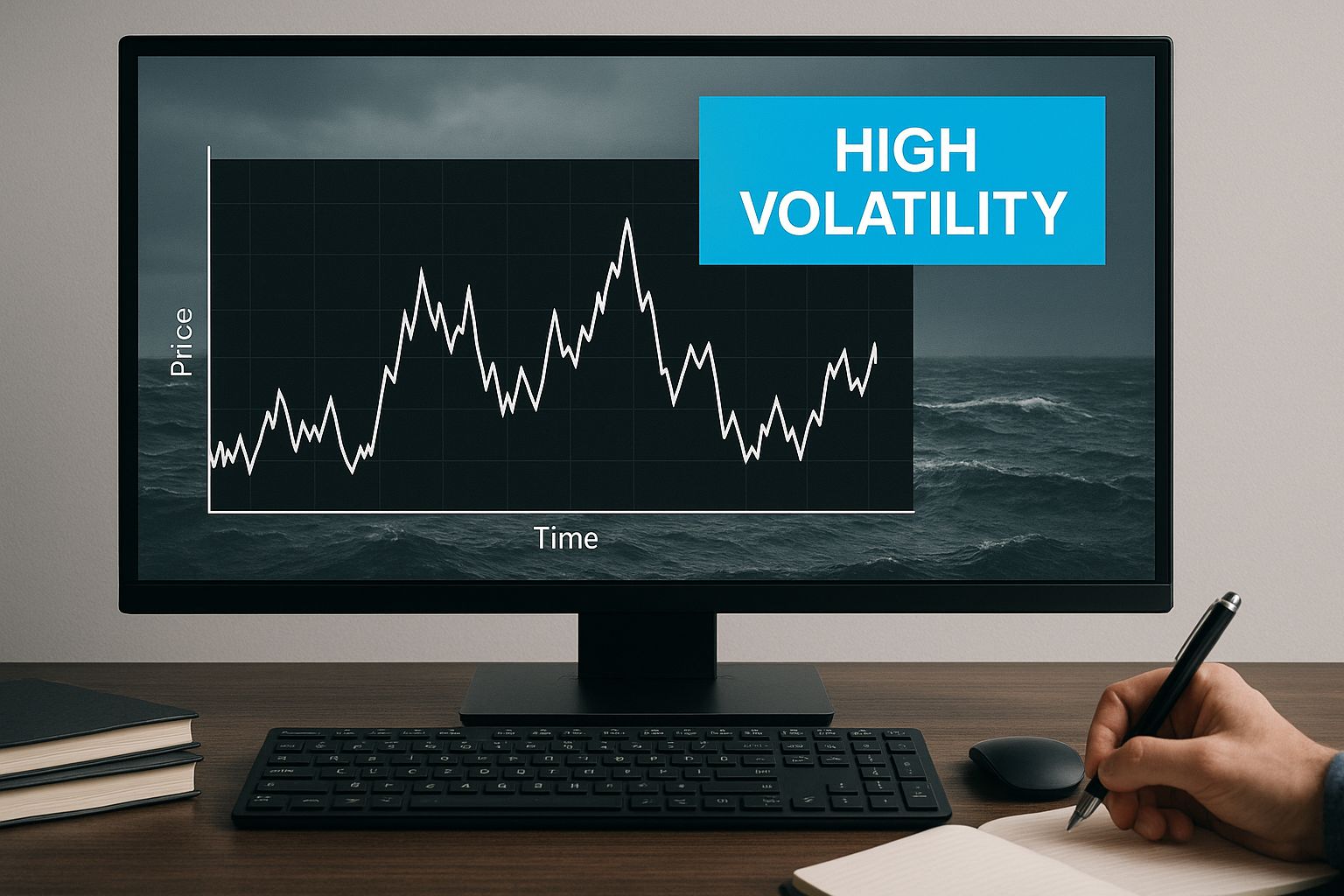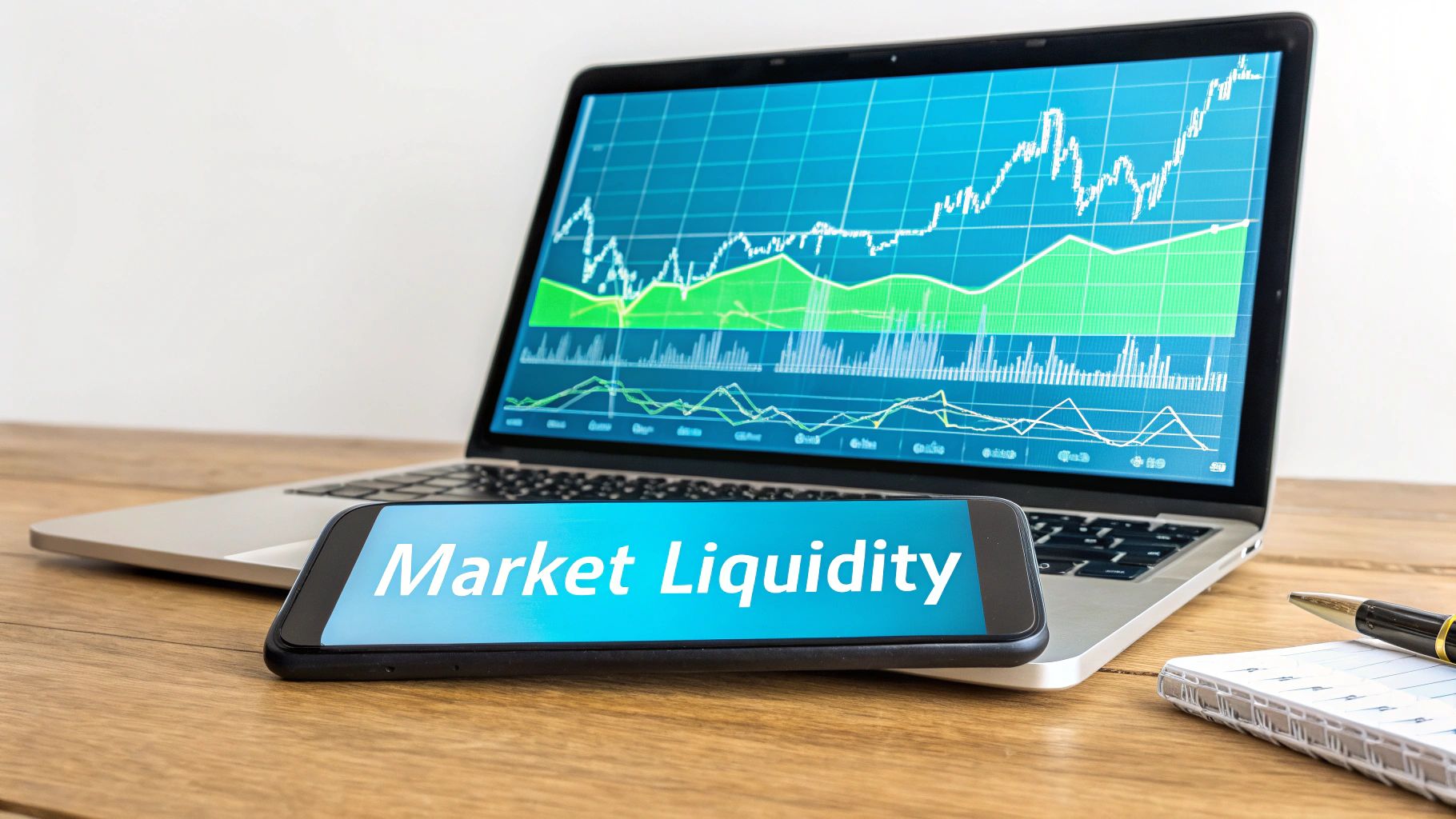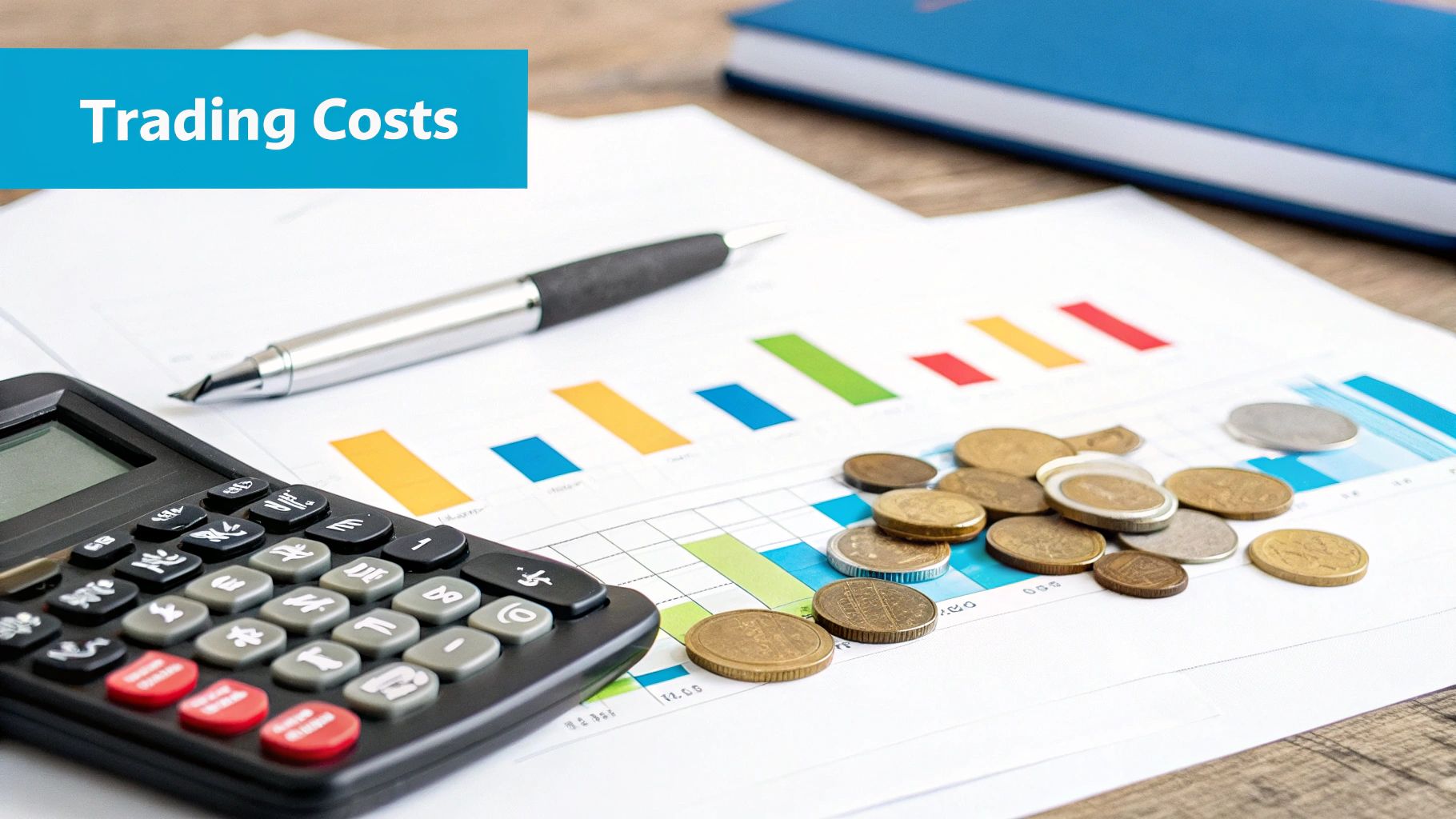




At its heart, the forex vs. stocks debate boils down to a simple question: Do you want to trade on the shifting values of global currencies, or do you want to own a small piece of a public company?
Choosing one over the other isn't about finding the "best" market. It's about finding the best fit for your own goals, risk appetite, and even your daily schedule.
Figuring out where to put your money is the first real decision every trader has to make. The fast-paced, 24/5 world of forex appeals to some, while others prefer the more traditional, ownership-driven model of the stock market. Both have massive potential, but they play by very different rules and require completely different mindsets to succeed.
Think of it this way: with stocks, you're investing in a specific company's future. You're betting on its growth, its leadership, and its ability to innovate, hoping to benefit from long-term gains and maybe even dividends.
Forex, on the other hand, is a global battlefield of economies. You're not buying anything tangible; you're speculating on the relative strength of one country's currency against another, driven by huge macroeconomic forces like interest rates, inflation reports, and political events.
To really get a feel for which market suits you, it helps to see them side-by-side. These aren't just minor details; they fundamentally change how you trade.
Ultimately, success comes down to matching your strategy to the market's unique rhythm. Whether you're analyzing a country's GDP to trade the EUR/USD or pouring over a company's quarterly report for its stock, having the right tools is key. This is where modern solutions like the AI-driven signals from EzAlgo can give you an edge, helping you spot opportunities in either market. The choice becomes less about which one is "easier" and more about which one aligns with your vision.
Before you can decide where to put your money, you need to understand the fundamental DNA of the forex and stock markets. They aren't just two sides of the same coin; they are entirely different animals, each with its own rhythm, rules, and personality. How they operate day-to-day will shape your entire trading experience.
The first thing that hits you is the sheer scale of the forex market. It's the biggest financial market on the planet, hands down, with daily trading volumes hovering around a staggering $6.6 to $7 trillion. To put that in perspective, all the world's stock markets combined don't even come close.
This ocean of money creates incredibly high liquidity. In practical terms, this means you can jump in and out of major currency trades almost instantly without causing a ripple in the price. For stocks, liquidity is a different story. A giant like Apple (AAPL) trades with massive volume, but a small-cap stock might have you waiting for a buyer or seller, and your own trade could easily move the price against you.
When can you trade? This is a huge lifestyle and strategy question. The forex market never truly sleeps, running 24 hours a day, five days a week. It’s a continuous global relay race, passing the baton from Sydney to Tokyo, then to London, and finally to New York. This gives you the freedom to trade whenever it suits you.
Stock markets, on the other hand, stick to a traditional workday. The New York Stock Exchange, for example, is open from 9:30 AM to 4:00 PM ET. If you have a day job or live in a different time zone, this can be a major hurdle.
The 24-hour nature of forex lets you react to major global news the second it breaks, whether it's midnight or noon. Stock traders often have to wait for the opening bell, watching helplessly as pre-market activity builds up based on overnight news.
Finally, let's talk about focus. The stock market is a universe of choices. You have thousands of companies across dozens of global exchanges, from tech and healthcare to industrial and consumer goods. Success here often means becoming an expert on specific companies, their management, and their industry.
Forex is much more concentrated. While there are many currency pairs, the vast majority of trading happens in just a few majors like the EUR/USD, GBP/USD, and USD/JPY. This allows you to focus your energy on the big-picture macroeconomic trends—like interest rate changes—that move entire economies. If you want to go deeper, our guide on how interest rates affect the forex market is a great place to start.
This image below gives you a sense of the kind of volatility we're talking about in these markets.

The constant movement captured here is typical of a market that's always on, always reacting, and always liquid.
For a quick side-by-side view, here’s a table that breaks down these core differences.
As you can see, these aren't minor distinctions. They are core characteristics that define how you'll approach trading, risk, and strategy in each market.

To really get a handle on trading, you have to understand how a market moves. It's not just about the numbers; it's about the personality. When you put forex and stocks side-by-side, it’s clear they don’t just move differently—they have completely unique temperaments, each with its own brand of volatility driven by very different things.
Forex volatility often feels like a short, sharp shock. Prices can whip around in a flash based on a single piece of macroeconomic news, like a surprise inflation report or a central bank changing interest rates. These moments create sudden, high-velocity moves, offering a quick window of opportunity for traders who are ready to pounce.
The stock market, on the other hand, tends to move in longer, more drawn-out waves. Sure, a single stock can go wild on an earnings miss, but the market as a whole usually follows broader, cyclical trends that can unfold over years.
A huge differentiator is how those long-term trends play out. The stock market is famous for its cyclical behavior, where different asset classes take turns leading the pack for long stretches. For example, historical data since 1975 shows that the leadership between U.S. and international stocks has tended to switch hands in cycles averaging about 8 years. This kind of predictability gives investors a completely different strategic angle. You can dig deeper into these stock market cycles and their historical performance.
Forex just doesn't work that way. There aren't multi-year performance cycles. Instead, currency values are in a constant state of flux, reacting to an ever-shifting mix of interest rates, economic policies, political news, and global trade. The forex market is always reacting, not following a long-term, predictable pattern.
The core difference is the rhythm. Stock market volatility often builds up over weeks or months, creating sustained trends you can ride. Forex volatility is usually a reaction to a specific event, leading to sharp, immediate price action that can be over just as quickly as it began.
This distinction has a direct impact on how you trade. Stock traders are often looking for momentum and trend continuation, while forex traders need to become experts at reading the tea leaves of economic calendars and geopolitical headlines.
Because these markets behave so differently, you can't just copy and paste your strategy from one to the other. Your approach has to fit the environment.
For Forex Traders: Success often comes down to being nimble. Your strategy might be built around capturing quick profits from price swings that follow major news. Risk management is everything here—tight stop-losses are non-negotiable to guard against those sudden, gut-wrenching reversals.
For Stock Traders: Here, the game is often about identifying and riding longer-term trends. This might mean holding positions for weeks, months, or even years. Your decisions are guided more by a company's fundamental health and the big-picture economic outlook.
Ultimately, choosing between forex and stocks means asking yourself which market’s behavior clicks with your own personality and trading style. Are you built for the rapid-fire sprints of forex, or do you prefer the patient, marathon-like pace of stocks?

When you get down to the brass tacks of trading, the financial realities of forex and stocks are worlds apart. We’re talking about leverage, trading costs, and the very nature of the risks you'll face. Getting this right is crucial for protecting your capital and making sure your strategy actually fits your comfort level with risk.
The biggest difference you'll notice right away is leverage. The forex market is famous for offering incredibly high leverage—sometimes 50:1 or even higher. It sounds great on the surface; you can control a massive position with just a little bit of your own money. But this is a double-edged sword. While it can amplify your wins, it magnifies your losses just as easily, making it a powerful but potentially dangerous tool if you're not careful.
On the other hand, the stock market is much more conservative. Leverage is typically capped at 2:1 for day trading. This lower limit acts as a built-in safety net, significantly reducing the chances of one bad trade wiping out your account.
How you pay to play is also fundamentally different in each market. Each cost structure has its pros and cons, and they directly impact your profitability.
How Forex Trading Costs Work: The main cost is the spread, which is just the tiny difference between the bid (sell) and ask (buy) price for a currency pair. Most forex brokers will tell you their trading is "commission-free" because they bake their fee right into that spread.
How Stock Trading Costs Work: With stocks, you’re usually looking at commissions for every trade you make, both when you buy and when you sell. While a lot of brokers now offer zero-commission trades for certain stocks, don't forget to account for other potential costs like exchange or regulatory fees.
When comparing forex vs stocks, think of leverage as a magnifying glass. In forex, that glass has extreme magnification, making small market moves look huge—for better or worse. In stocks, the magnification is much lower, giving you a clearer, less distorted view of your position.
Finally, the kinds of risks you're up against are completely unique to each market.
If you’re a stock trader, you live and die by company-specific risk. One bad earnings report, a messy product recall, or a scandal in the C-suite can send a company’s stock into a nosedive, even if the rest of the market is doing just fine.
In forex, your risks are macroeconomic. Your trades are exposed to massive global events—think central bank interest rate decisions, geopolitical flare-ups, or major economic data releases. You’re not worried about a single company’s performance; you’re betting on the economic health of an entire nation.
Looking back at history, a major stock market crash of 30% or more is a huge deal, but these events are relatively rare. The forex market, by contrast, is a creature of constant, short-term price swings. Its sheer size also makes it less susceptible to the kind of long-term, coordinated downturns you sometimes see in equities. You can dig into a history of major stock market declines to see just how different these patterns are. This structural difference demands a completely different mindset when it comes to managing your risk.
The forex vs. stocks debate isn't about which market is "better." It's about finding the one that clicks with your personality, your schedule, and what you want to achieve financially. Forget theory for a moment and think about your own temperament. Are you someone who thrives on quick, decisive action, or do you prefer to play the long game?
Picking a market that fits your natural rhythm can make all the difference. It's often what separates a frustrating grind from a trading approach you can stick with for the long haul. Let’s look at a few common trader profiles and see where you might fit in.
Day traders live for the action. They aim to jump in and out of trades within the same day, grabbing profits from small, quick price moves. If this sounds like you, the forex market is probably where you'll feel most at home.
Its 24-hour accessibility means there's always a market open somewhere in the world, so you’re not stuck waiting for a bell to ring. More importantly, the massive liquidity in major currency pairs lets you execute trades instantly without the price slipping from under you—that's absolutely crucial when your whole strategy is built on speed.
Swing traders have a bit more patience, holding positions for a few days or even weeks to catch a larger move. You can do this in either market, but the game is played differently in each.
The real question is, which type of story are you better at reading? Macroeconomic trends or company-specific news?
A day trader needs the constant motion and deep liquidity of forex to succeed. A long-term investor, however, needs the growth potential and ownership benefits that come with stocks. Your timeline is your most important guide.
If your goal is to build wealth over months and years, not days, then the stock market is almost always the answer. Owning a stock means you own a small piece of a business, giving you a stake in its future success and innovation.
This approach lets you benefit from capital appreciation as the company grows, and you can also earn dividend income along the way. Forex, on the other hand, is all about short-term currency wiggles and heavy leverage. It simply wasn't built for a "buy and hold" approach. For anyone with a long-term vision, stocks offer a clear path to building real wealth.
No matter which market you choose, having the right tools can make all the difference. In the fast-paced world of trading, AI-powered signals give you a serious leg up, whether you’re trading forex or stocks. Think of them as an analytical powerhouse, digging through mountains of data to find opportunities a human eye would almost certainly miss.
AI isn't just another chart indicator. It’s a sophisticated engine that crunches a massive amount of information to deliver clear, actionable insights. This helps take emotion out of the equation—a common pitfall that leads to bad decisions like panic selling or chasing a dead-end trade. You get objective, data-backed signals to guide your next move.
The forex market is a perfect playground for AI. It thrives on processing huge amounts of macroeconomic data, from inflation reports and interest rate decisions to breaking geopolitical news. Because currency values react in a split second to global events, AI’s ability to analyze everything at once is a game-changer.
When it comes to stocks, AI gets granular. It dives deep into company-specific data, looking far beyond just the stock price. The algorithms analyze everything from quarterly earnings reports and insider trading activity to subtle shifts in industry trends to pinpoint stocks that might be over or undervalued.
The real magic of AI is its ability to connect the dots between seemingly unrelated information. It might see a spike in a commodity price and connect it to the future earnings of a specific company, flagging a buy signal well before that news becomes common knowledge.
Adding AI signals to your strategy shifts you from being reactive to proactive. You’re no longer just responding to what the market does; you're better positioned to anticipate what it might do next. If you're ready to explore this further, you can learn more about how to use AI trading signals to sharpen your approach.
Let's tackle some of the most common questions traders have when weighing forex against stocks. These are the practical, real-world concerns that pop up when you're trying to decide where to focus your energy.
For most new traders, stocks are the more welcoming starting point. It’s just easier to wrap your head around buying a small piece of a company you already know, like Apple or Amazon, than it is to decipher the complex global economic forces that move currency pairs.
Plus, the lower leverage in the stock market acts as a built-in safety net. It helps prevent a simple beginner’s mistake from wiping out your account, giving you more room to learn without catastrophic financial consequences.
This is a classic question, but the truth is, one market isn't automatically more profitable than the other. Your success comes down to your strategy, skill, and how well you manage risk. Forex does offer much higher leverage, which can turn small price movements into big gains—and that potential for quick profit is a major draw.
However, that exact same leverage is a double-edged sword. It can amplify your losses just as quickly as your wins, making it a true high-risk, high-reward game. Stocks, in contrast, often shine over the long haul, building wealth through steady growth and dividends. It really depends on your goals and your stomach for risk.
The potential for profit in either market is tied directly to how well you execute your strategy. High leverage in forex is a powerful tool, but it's not a shortcut to guaranteed returns.
Absolutely. In fact, many seasoned traders actively participate in both markets. Spreading your activity across forex and stocks allows you to take advantage of different economic conditions and opportunities as they arise.
For instance, you might build a long-term portfolio with stocks while using forex for more speculative, short-term trades based on major economic news. The trick is to have separate, tailored strategies for each. You can't just copy and paste your stock strategy into forex and expect it to work. Success comes from understanding the unique rhythm and risks of each market.
Ready to trade with a data-driven edge in either market? EzAlgo provides AI-powered signals and advanced tools designed for TradingView users. Eliminate emotional guesswork and gain clarity on your next move. Get started with EzAlgo today.